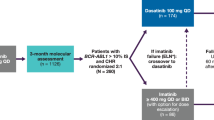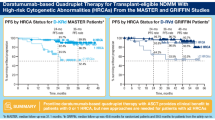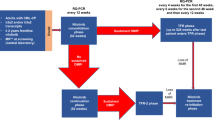Abstract
In this prospective phase 2 clinical trial conducted by Cancer and Leukemia Group B (CALGB, now the Alliance), we studied decitabine as maintenance therapy for younger adults with acute myeloid leukemia (AML) who remained in first complete remission (CR1) following intensive induction and consolidation. Given that decitabine is clinically active in AML and with hypomethylating activity distinct from cytotoxic chemotherapy, we hypothesized that 1 year of maintenance therapy would improve disease-free survival (DFS) for AML patients <60 years, who did not receive allogeneic stem cell transplantation in CR1. After blood count recovery from final consolidation, patients received decitabine at 20 mg/m2 intravenously daily for 4–5 days, every 6 weeks for eight cycles. One hundred and thirty-four patients received decitabine and 85 (63%) had favorable risk AML. The median number of cycles received was 7 (range: 1–8) and the primary reason for discontinuation was relapse. DFS at 1 year and 3 years was 79% and 54%, respectively. These results are similar to the outcomes in the historical control comprising similar patients treated on recent CALGB trials. Thus, maintenance with decitabine provided no benefit overall. Standard use of decitabine maintenance in younger AML patients in CR1 is not warranted. This trial was registered at www.clinicaltrials.gov as NCT00416598.
This is a preview of subscription content, access via your institution
Access options
Subscribe to this journal
Receive 12 print issues and online access
$259.00 per year
only $21.58 per issue
Buy this article
- Purchase on Springer Link
- Instant access to full article PDF
Prices may be subject to local taxes which are calculated during checkout

Similar content being viewed by others
References
Champlin R, Jacobs A, Gale RP, Boccia R, Elashoff R, Foon K et al. Prolonged survival in acute myelogenous leukaemia without maintenance chemotherapy. Lancet 1984; 1: 894–896.
Raza A, Preisler HD, Browman GP, Larson RA, Rustum YM, Goldberg J et al. Long-term outcome of patients with acute myelogenous leukemia: the role of maintenance therapy, consolidation therapy and the predictive value of two in vitro assays. Leuk Lymphoma 1993; 10: 57–66.
Sauter C, Berchtold W, Fopp M, Gratwohl A, Imbach P, Maurice P et al. Acute myelogenous leukaemia: maintenance chemotherapy after early consolidation treatment does not prolong survival. Lancet 1984; 1: 379–382.
Büchner T, Berdel WE, Schoch C, Haferlach T, Serve HL, Kienast J et al. Double induction containing either two courses or one course of high-dose cytarabine plus mitoxantrone and postremission therapy by either autologous stem-cell transplantation or by prolonged maintenance for acute myeloid leukemia. J Clin Oncol 2006; 24: 2480–2489.
Büchner T, Hiddemann W, Berdel WE, Wörmann B, Schoch C, Fonatsch C et al. 6-Thioguanine, cytarabine, and daunorubicin (TAD) and high-dose cytarabine and mitoxantrone (HAM) for induction, TAD for consolidation, and either prolonged maintenance by reduced monthly TAD or TAD-HAM-TAD and one course of intensive consolidation by sequential HAM in adult patients at all ages with de novo acute myeloid leukemia (AML): a randomized trial of the German AML Cooperative Group. J Clin Oncol 2003; 21: 4496–4504.
Santini V, Kantarjian HM, Issa JP. . Changes in DNA methylation in neoplasia: pathophysiology and therapeutic implications. Ann Intern Med 2001; 134: 573–586.
Silverman LR, Demakos EP, Peterson BL, Kornblith AB, Holland JC, Odchimar-Reissig R et al. Randomized controlled trial of azacitidine in patients with the myelodysplastic syndrome: a study of the Cancer and Leukemia Group B. J Clin Oncol 2002; 20: 2429–2440.
Kantarjian H, Issa J-PJ, Rosenfeld CS, Bennett JM, Albitar M, DiPersio J et al. Decitabine improves patient outcomes in myelodysplastic syndromes: results of a phase III randomized study. Cancer 2006; 106: 1794–1803.
Fenaux P, Mufti GJ, Hellstrom-Lindberg E, Santini V, Finelli C, Giagounidis A et al. Efficacy of azacitidine compared with that of conventional care regimens in the treatment of higher-risk myelodysplastic syndromes: a randomised, open-label, phase III study. Lancet Oncol 2009; 10: 223–232.
Fenaux P, Mufti GJ, Hellström-Lindberg E, Santini V, Gattermann N, Germing U et al. Azacitidine prolongs overall survival compared with conventional care regimens in elderly patients with low bone marrow blast count acute myeloid leukemia. J Clin Oncol 2010; 28: 562–569.
Issa J-PJ, Garcia-Manero G, Giles FJ, Mannari R, Thomas D, Faderl S et al. Phase 1 study of low-dose prolonged exposure schedules of the hypomethylating agent 5-aza-2'-deoxycytidine (decitabine) in hematopoietic malignancies. Blood 2004; 103: 1635–1640.
Blum W, Garzon R, Klisovic RB, Schwind S, Walker A, Geyer S et al. Clinical response and miR-29b predictive significance in older AML patients treated with a 10- day schedule of decitabine. Proc Natl Acad Sci USA 2010; 107: 7473–7478.
Cashen AF, Schiller GJ, O'Donnell MR, DiPersio JF . Multicenter, phase II study of decitabine for the first-line treatment of older patients with acute myeloid leukemia. J Clin Oncol 2010; 28: 556–561.
Kantarjian HM, Thomas XG, Dmoszynska A, Wierzbowska A, Mazur G, Mayer J et al. Multicenter, randomized, open-label, phase III trial of decitabine versus patient choice, with physician advice, of either supportive care or low-dose cytarabine for the treatment of older patients with newly diagnosed acute myeloid leukemia. J Clin Oncol 2012; 30: 2670–2677.
Boumber Y, Kantarjian H, Jorgensen J, Wen S, Faderl S, Castoro R et al. A randomized study of decitabine versus conventional care for maintenance therapy in patients with acute myeloid leukemia in complete remission [letter]. Leukemia 2012; 26: 2428–2431.
Mrózek K, Prior TW, Edwards C, Marcucci G, Carroll AJ, Snyder PJ et al. Comparison of cytogenetic and molecular genetic detection of t(8;21) and inv(16) in a prospective series of adults with de novo acute myeloid leukemia: a Cancer and Leukemia Group B study. J Clin Oncol 2001; 19: 2482–2492.
Linker CA, Ries CA, Damon LE, Sayre P, Navarro W, Rugo HS et al. Autologous stem cell transplantation for acute myeloid leukemia in first remission. Biol Blood Marrow Transplant 2000; 6: 50–57.
Linker CA, Owzar K, Powell B, Hurd D, Damon LE, Archer LE et al. Auto-SCT for AML in second remission: CALGB study 9620. Bone Marrow Transplant 2009; 44: 353–359.
Mrózek K, Carroll AJ, Maharry K, Rao KW, Patil SR, Pettenati MJ et al. Central review of cytogenetics is necessary for cooperative group correlative and clinical studies of adult acute leukemia: the Cancer and Leukemia Group B experience. Int J Oncol 2008; 33: 239–244.
Whitman SP, Archer KJ, Feng L, Baldus C, Becknell B, Carlson BD et al. Absence of the wild-type allele predicts poor prognosis in adult de novo acute myeloid leukemia with normal cytogenetics and the internal tandem duplication of FLT3: a Cancer and Leukemia Group B study. Cancer Res 2001; 61: 7233–7239.
Thiede C, Steudel C, Mohr B, Schaich M, Schäkel U, Platzbecker U et al. Analysis of FLT3-activating mutations in 979 patients with acute myelogenous leukemia: association with FAB subtypes and identification of subgroups with poor prognosis. Blood 2002; 99: 4326–4335.
Marcucci G, Maharry K, Radmacher MD, Mrózek K, Vukosavljevic T, Paschka P et al. Prognostic significance of, and gene and microRNA expression signatures associated with, CEBPA mutations in cytogenetically normal acute myeloid leukemia with high-risk molecular features: a Cancer and Leukemia Group B study. J Clin Oncol 2008; 26: 5078–5087.
Becker H, Marcucci G, Maharry K, Radmacher MD, Mrózek K, Margeson D et al. Favorable prognostic impact of NPM1 mutations in older patients with cytogenetically normal de novo acute myeloid leukemia and associated gene- and microRNA-expression signatures: a Cancer and Leukemia Group B study. J Clin Oncol 2010; 28: 596–604.
Döhner H, Estey EH, Amadori S, Appelbaum FR, Büchner T, Burnett AK et al. Diagnosis and management of acute myeloid leukemia in adults: recommendations from an international expert panel, on behalf of the European LeukemiaNet. Blood 2010; 115: 453–474.
Cassileth PA, Lynch E, Hines JD, Oken MM, Mazza JJ, Bennett JM et al. Varying intensity of postremission therapy in acute myeloid leukemia. Blood 1992; 79: 1924–1930.
Löwenberg B, Suciu S, Archimbaud E, Haak H, Stryckmans P, de Cataldo R et al. Mitoxantrone versus daunorubicin in induction-consolidation chemotherapy–the value of low-dose cytarabine for maintenance of remission, and an assessment of prognostic factors in acute myeloid leukemia in the elderly: final report of the European Organization for the Research and Treatment of Cancer and the Dutch-Belgian Hemato-Oncology Cooperative Hovon Group randomized phase III study AML-9. J Clin Oncol 1998; 16: 872–881.
Petersdorf SH, Kopecky KJ, Slovak M, Willman C, Nevill T, Brandwein J et al. A phase 3 study of gemtuzumab ozogamicin during induction and postconsolidation therapy in younger patients with acute myeloid leukemia. Blood 2013; 121: 4854–4860.
Löwenberg B, Beck J, Graux C, van Putten W, Schouten HC, Verdonck LF et al. Gemtuzumab ozogamicin as postremission treatment in AML at 60 years of age or more: results of a multicenter phase 3 study. Blood 2010; 115: 2586–2591.
Kolitz JE, George SL, Benson DM Jr, Maharry K, Marcucci G, Vij R et al. Recombinant interleukin-2 in patients aged younger than 60 years with acute myeloid leukemia in first complete remission: results from Cancer and Leukemia Group B 19808. Cancer 2014; 120: 1010–1017.
Baer MR, George SL, Caligiuri MA, Sanford BL, Bothun SM, Mrózek K et al. Low-dose interleukin-2 immunotherapy does not improve outcome of patients age 60 years and older with acute myeloid leukemia in first complete remission: Cancer and Leukemia Group B study 9720. J Clin Oncol 2008; 26: 4934–4939.
Cortes JE, Kantarjian HM, O'Brien S, Giles F, Keating MJ, Freireich EJ et al. A pilot study of interleukin-2 for adult patients with acute myelogenous leukemia in first complete remission. Cancer 1999; 85: 1506–1513.
Blaise D, Attal M, Reiffers J, Michallet M, Bellanger C, Pico JL et al. Randomized study of recombinant interleukin-2 after autologous bone marrow transplantation for acute leukemia in first complete remission. Eur Cytokine Netw 2000; 11: 91–98.
Khatri VP, Baiocchi RA, Bernstein ZP, Caligiuri MA . Immunotherapy with low-dose interleukin-2: rationale for prevention of immune-deficiency-associated cancer. Cancer J Sci Am 1997; 3 (Suppl 1): S129–S136.
Stone RM, DeAngelo DJ, Janosova A, Galinsky I, Canning C, Ritz J et al. Low dose interleukin-2 following intensification therapy with high dose cytarabine for acute myelogenous leukemia in first complete remission. Am J Hematol 2008; 83: 771–777.
Brune M, Castaigne S, Catalano J, Gehlsen K, Ho AD, Hofmann WK et al. Improved leukemia-free survival after postconsolidation immunotherapy with histamine dihydrochloride and interleukin-2 in acute myeloid leukemia: results of a randomized phase 3 trial. Blood 2006; 108: 88–96.
Buyse M, Squifflet P, Lange BJ, Alonzo TA, Larson RA, Kolitz JE et al. Individual patient data meta-analysis of randomized trials evaluating IL-2 monotherapy as remission maintenance therapy in acute myeloid leukemia. Blood 2011; 117: 7007–7013.
Liu S, Shen T, Huynh L, Klisovic MI, Rush LJ, Ford JL et al. Interplay of RUNX1/MTG8 and DNA methyltransferase 1 in acute myeloid leukemia. Cancer Res 2005; 65: 1277–1284.
Acknowledgements
We thank patients and their families, collaborators and staff in the CALGB and Alliance member institutions/data center and the Alliance Leukemia Tissue Bank/Ms Donna Bucci. We also thank John C Byrd, MD, and the team in the Leukemia and Leukemia Correlative Science Committees for the Alliance for review of the manuscript and assistance with molecular data. This trial was sponsored by the NCI Cancer Therapy Evaluation Program. We gratefully acknowledge the enormous contributions to this study and to the field of medicine by our friend Dr Meir Wetzler (deceased February 2015). Research reported in this publication was supported by the National Cancer Institute of the National Institutes of Health under Award Numbers U10CA31946, U10CA33601 (to CALGB), U10CA180821 and U10CA180882 (to the Alliance for Clinical Trials in Oncology), and NIH/NCI K23CA120708. Additional support was provided under CA140158, CA016058, CA180850, CA101140 and CA128377. The content is solely the responsibility of the authors and does not necessarily represent the official views of the National Institutes of Health.
Author contributions
WB was the Study Chair of the clinical trial. RAL was the Chair of the Leukemia Committee for the Alliance (formerly CALGB). GM also assisted in the design of the study. WB, RK, DJD, GU, BLP, WS, MRB, JEK, ESW, GM, RMS and RAL enrolled patients, provided clinical management and facilitated the conduct of the study. SG, BLS and JK provided statistical support. EH and BLS managed the database. WB and RK audited the data case report forms. CDB provided support and oversight for molecular studies. KM assisted with data acquisition and interpretation, manuscript writing and formatting. All authors reviewed the results and approved manuscript submission.
Author information
Authors and Affiliations
Consortia
Corresponding author
Ethics declarations
Competing interests
The authors declare no conflict of interest.
Additional information
Preliminary results of this manuscript were presented at the 54th Annual Meeting of the American Society of Hematology, Atlanta, GA, 9 December 2012.
Supplementary Information accompanies this paper on the Leukemia website
Supplementary information
Rights and permissions
About this article
Cite this article
Blum, W., Sanford, B., Klisovic, R. et al. Maintenance therapy with decitabine in younger adults with acute myeloid leukemia in first remission: a phase 2 Cancer and Leukemia Group B Study (CALGB 10503). Leukemia 31, 34–39 (2017). https://doi.org/10.1038/leu.2016.252
Received:
Revised:
Accepted:
Published:
Issue Date:
DOI: https://doi.org/10.1038/leu.2016.252
This article is cited by
-
Hypomethylating agent monotherapy in core binding factor acute myeloid leukemia: a French multicentric retrospective study
Annals of Hematology (2024)
-
Overcoming relapse: prophylactic or pre-emptive use of azacitidine or FLT3 inhibitors after allogeneic transplantation for AML or MDS
International Journal of Hematology (2023)
-
Oncology stewardship in acute myeloid leukemia
Annals of Hematology (2022)
-
Autologous hematopoietic stem cell transplantation followed by interleukin-2 for adult acute myeloid leukemia patients with favorable or intermediate risk after complete remission
Annals of Hematology (2022)
-
Recent developments in epigenetic cancer therapeutics: clinical advancement and emerging trends
Journal of Biomedical Science (2021)



